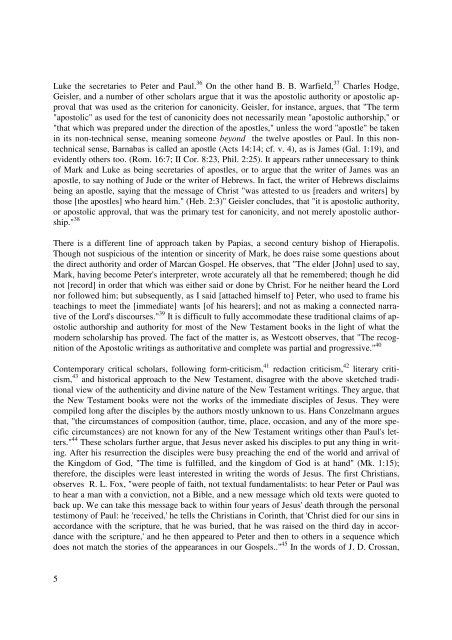Scripture and God in Christianity
Scripture and God in Christianity
Scripture and God in Christianity
Create successful ePaper yourself
Turn your PDF publications into a flip-book with our unique Google optimized e-Paper software.
Luke the secretaries to Peter <strong>and</strong> Paul. 36 On the other h<strong>and</strong> B. B. Warfield, 37 Charles Hodge,<br />
Geisler, <strong>and</strong> a number of other scholars argue that it was the apostolic authority or apostolic approval<br />
that was used as the criterion for canonicity. Geisler, for <strong>in</strong>stance, argues, that "The term<br />
"apostolic" as used for the test of canonicity does not necessarily mean "apostolic authorship," or<br />
"that which was prepared under the direction of the apostles," unless the word "apostle" be taken<br />
<strong>in</strong> its non-technical sense, mean<strong>in</strong>g someone beyond the twelve apostles or Paul. In this nontechnical<br />
sense, Barnabas is called an apostle (Acts 14:14; cf. v. 4), as is James (Gal. 1:19), <strong>and</strong><br />
evidently others too. (Rom. 16:7; II Cor. 8:23, Phil. 2:25). It appears rather unnecessary to th<strong>in</strong>k<br />
of Mark <strong>and</strong> Luke as be<strong>in</strong>g secretaries of apostles, or to argue that the writer of James was an<br />
apostle, to say noth<strong>in</strong>g of Jude or the writer of Hebrews. In fact, the writer of Hebrews disclaims<br />
be<strong>in</strong>g an apostle, say<strong>in</strong>g that the message of Christ "was attested to us [readers <strong>and</strong> writers] by<br />
those [the apostles] who heard him." (Heb. 2:3)" Geisler concludes, that "it is apostolic authority,<br />
or apostolic approval, that was the primary test for canonicity, <strong>and</strong> not merely apostolic authorship."<br />
38<br />
There is a different l<strong>in</strong>e of approach taken by Papias, a second century bishop of Hierapolis.<br />
Though not suspicious of the <strong>in</strong>tention or s<strong>in</strong>cerity of Mark, he does raise some questions about<br />
the direct authority <strong>and</strong> order of Marcan Gospel. He observes, that "The elder [John] used to say,<br />
Mark, hav<strong>in</strong>g become Peter's <strong>in</strong>terpreter, wrote accurately all that he remembered; though he did<br />
not [record] <strong>in</strong> order that which was either said or done by Christ. For he neither heard the Lord<br />
nor followed him; but subsequently, as I said [attached himself to] Peter, who used to frame his<br />
teach<strong>in</strong>gs to meet the [immediate] wants [of his hearers]; <strong>and</strong> not as mak<strong>in</strong>g a connected narrative<br />
of the Lord's discourses." 39 It is difficult to fully accommodate these traditional claims of apostolic<br />
authorship <strong>and</strong> authority for most of the New Testament books <strong>in</strong> the light of what the<br />
modern scholarship has proved. The fact of the matter is, as Westcott observes, that "The recognition<br />
of the Apostolic writ<strong>in</strong>gs as authoritative <strong>and</strong> complete was partial <strong>and</strong> progressive." 40<br />
Contemporary critical scholars, follow<strong>in</strong>g form-criticism, 41 redaction criticism, 42 literary criticism,<br />
43 <strong>and</strong> historical approach to the New Testament, disagree with the above sketched traditional<br />
view of the authenticity <strong>and</strong> div<strong>in</strong>e nature of the New Testament writ<strong>in</strong>gs. They argue, that<br />
the New Testament books were not the works of the immediate disciples of Jesus. They were<br />
compiled long after the disciples by the authors mostly unknown to us. Hans Conzelmann argues<br />
that, "the circumstances of composition (author, time, place, occasion, <strong>and</strong> any of the more specific<br />
circumstances) are not known for any of the New Testament writ<strong>in</strong>gs other than Paul's letters."<br />
44 These scholars further argue, that Jesus never asked his disciples to put any th<strong>in</strong>g <strong>in</strong> writ<strong>in</strong>g.<br />
After his resurrection the disciples were busy preach<strong>in</strong>g the end of the world <strong>and</strong> arrival of<br />
the K<strong>in</strong>gdom of <strong>God</strong>, "The time is fulfilled, <strong>and</strong> the k<strong>in</strong>gdom of <strong>God</strong> is at h<strong>and</strong>" (Mk. 1:15);<br />
therefore, the disciples were least <strong>in</strong>terested <strong>in</strong> writ<strong>in</strong>g the words of Jesus. The first Christians,<br />
observes R. L. Fox, "were people of faith, not textual fundamentalists: to hear Peter or Paul was<br />
to hear a man with a conviction, not a Bible, <strong>and</strong> a new message which old texts were quoted to<br />
back up. We can take this message back to with<strong>in</strong> four years of Jesus' death through the personal<br />
testimony of Paul: he 'received,' he tells the Christians <strong>in</strong> Cor<strong>in</strong>th, that 'Christ died for our s<strong>in</strong>s <strong>in</strong><br />
accordance with the scripture, that he was buried, that he was raised on the third day <strong>in</strong> accordance<br />
with the scripture,' <strong>and</strong> he then appeared to Peter <strong>and</strong> then to others <strong>in</strong> a sequence which<br />
does not match the stories of the appearances <strong>in</strong> our Gospels.." 45 In the words of J. D. Crossan,<br />
5
















